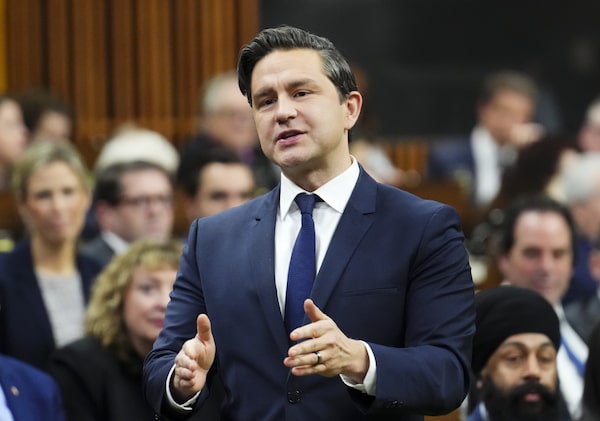
Conservative Leader Pierre Poilievre rises during Question Period in the House of Commons on Parliament Hill in Ottawa on Dec. 13, 2023.Sean Kilpatrick/The Canadian Press
The 4.5 million viewers who tuned into Radio-Canada’s Bye Bye sketch-comedy retrospective on New Year’s Eve and the following day were treated to a gut-splitting skit that depicted federal Conservative Leader Pierre Poilievre seeking an optician’s advice on new glasses.
The sketch, which parodied an ad for the New Look eyewear chain that ran endlessly on Quebec television in the fall, showed Mr. Poilievre trying out different frames – starting out with a couple of conservative (no pun intended) options before moving up to much bolder ones worthy of Elton John or Dame Edna. In the end, the optician suggests he ditch the specs altogether.
“It’s incredible,” she declares. “Just by taking off your glasses, you’ve gone from a ridiculous conspiracy theorist to an almost normal guy. I think you’ve found your new look, Pierre.” Then, realizing that might make him more popular, the optician declares: “What have I just done?”
The skit encapsulated the accepted wisdom according to which Mr. Poilievre only began climbing in the polls after he underwent a mid-2023 makeover, switching out his glasses for contact lenses and his business suits for sport jackets, T-shirts and jeans.
Even so, while the Conservatives have built up a double-digit lead in the polls in every other region of the country, they remain mired in third place in Quebec, far behind the Bloc Québécois and Liberals. An Abacus Data poll conducted in early January showed that only 33 per cent of Quebeckers think it is time for a change in government and that there is an acceptable alternative to Justin Trudeau’s Liberals; nationally, the figure stands at 53 per cent.
The Tories had hoped to see a bounce in Quebec after holding their national policy convention in Quebec City in September, but none materialized. Mr. Poilievre’s first campaign-style swing into the province since then got off to a bumpy start this week when airplane troubles forced him to cancel a trip to the Saguenay region, where the party is hoping to break through in the next election. A Monday night rally in the Quebec City region generated plenty of media buzz.
Former prime minister Stephen Harper proved in 2011 that the Tories do not need to win in Quebec to form a majority government, and, if recent polling trends hold, the next federal election could produce a similar outcome if the Conservatives sweep every other region of the country.
Mr. Poilievre has so far failed to attract any big-name candidates in Quebec. La Presse last month reported that he had spurned an offer from Coalition Avenir Québec Finance Minister Eric Girard to run for the Tories, citing their irreconcilable differences on climate policy.
In 2011, Quebeckers shocked even themselves by lining up behind the New Democratic Party – which had never been a factor in the province – in a bid to deny Mr. Harper his coveted majority. The Orange Wave saw the NDP under Quebec-born leader Jack Layton win 59 of Quebec’s then 75 seats and reduce the long dominant Bloc to just four seats. The Tories won only five ridings.
The NDP has since returned to its previous irrelevant status in Quebec and the Bloc again dominates the province outside of Montreal. The Liberals currently hold 16 of Montreal’s 18 ridings. The Bloc and NDP hold one each. Not much is expected to change in the next election.
There could be plenty of surprises outside of Montreal, however. The Anybody But Harper dynamic that dominated the 2011 campaign has not (so far, anyway) been replaced by an Anybody But Poilievre movement. Notwithstanding current polls, many analysts still expect a two-way fight between the Bloc and Tories in francophone ridings outside of Montreal.
Bloc Leader Yves-François Blanchet provided evidence of that when, in a Canadian Press interview last week, he bemoaned the increasing divide between Montreal and the rest of Quebec. He described the province’s largest city as “at best bilingual, possibly multilingual” where “the history, language, values and culture of the very generous host society are being marginalized.” For most Quebeckers, he added, “Montreal is becoming a foreign place.”
Such talk will clearly not endear Mr. Blanchet to the urban francophone progressives who once solidly backed the Bloc under former leader Gilles Duceppe. Most analysts saw his comments as a sign he is worried about losing ground to the Tories outside Montreal.
Indeed, Mr. Poilievre countenanced that idea on his swing through Quebec.
“The Bloc Québécois agrees with all of Justin Trudeau’s economic policies,” the Tory Leader insisted in a Radio-Canada interview. “Putting aside his wish for sovereignty, the Bloc leader agrees with Justin Trudeau on all the issues.”
Francophone Quebeckers have a reputation for being Canada’s most volatile voters, particularly at the federal level. Mr. Poilievre has not written off his chances with them, yet.
 Konrad Yakabuski
Konrad Yakabuski